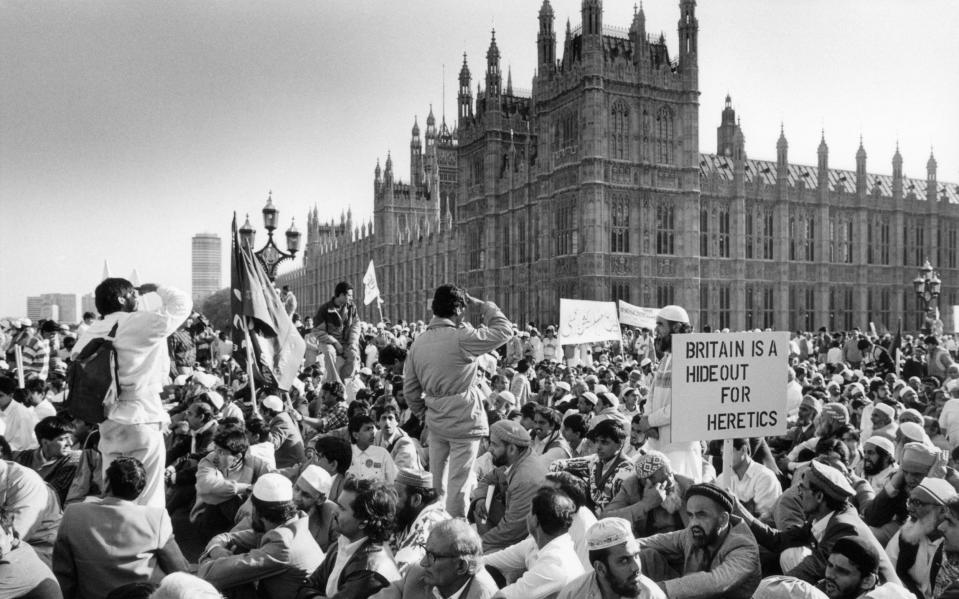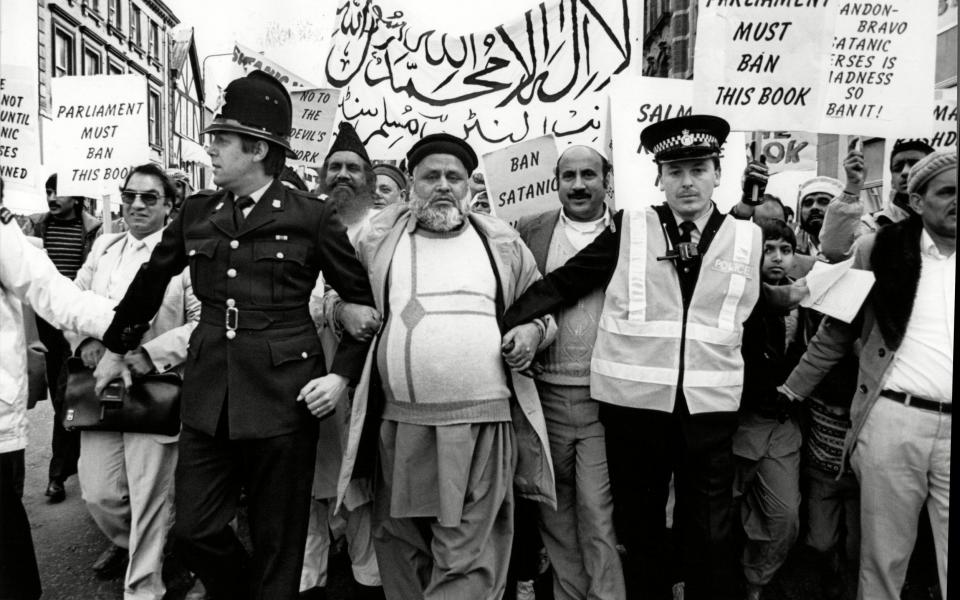The day Iran pronounced death on Salman Rushdie

On August 12 2022, Salman Rushdie was stabbed. The attack came with terrifying speed at the Chautauqua Institution in upstate New York. Rushdie, who had been about to deliver a lecture, was injured in his abdomen, thigh, chest, neck and face. He has now lost the sight in his right eye, as well as the use of one hand. Yet Rushdie has not only written a memoir about the assault, Knife, which is one of 2024’s most anticipated books, he has also displayed remarkable forbearance. In an interview last year, he said, “I’m lucky. What I really want to say is that my main overwhelming feeling is gratitude.”
The attack on Rushdie represented the culmination of more than a quarter-century of controversy that began with the publication of his fourth novel, The Satanic Verses, in 1988. The then 41-year-old author was a Booker Prize winner, for Midnight’s Children, and one of Britain’s most exciting voices. What he was not seen as, until September 26 that year, was a figure who would attract opprobrium for decades. The climate of fear engendered by his book still lingers on. Even today, many of those whom I approached for comment for this article would either only speak anonymously or not at all.
It was not long until The Satanic Verses drew the ire of fundamentalists, who objected to what they perceived as its blasphemous presentation of the apocryphal verses of the Koran. (The so-called “Satanic Verses” themselves are deeply controversial, in their suggestion that Mohammed was at one point misled by Satan into misinterpreting his entreaties for words of divine revelation, thus contradicting the prophet’s infallibility.)
It was banned in Pakistan in November 1988, but met with great acclaim in Britain, winning the Whitbread Award that month. Rushdie himself, who had been raised in a Kashmiri Muslim family, had anticipated some disquiet, but later commented that “I expected a few mullahs would be offended, call me names, and then I could defend myself in public.” A little healthy debate, after all, is good for one’s reputation – and for sales. Even as it went on to be banned in South Africa, Sri Lanka and Sudan, the book was regarded as one of the year’s most important publications.
However, when The Satanic Verses was published in the United States in February 1989, protests intensified, climaxing when the supreme leader of Iran, Ayatollah Ruhollah Khomeini, declared a fatwa against Rushdie and his publishers on Iranian radio on February 14. During this unwelcome Valentine’s Day gift, Khomeini stated, “I call on all valiant Muslims wherever they may be in the world to kill them… so that no one will dare insult the sacred beliefs of Muslims henceforth. And whoever is killed in this cause will be a martyr, Allah willing.” A $6 million bounty was placed on the author’s head, and all hell broke loose.

As the author and literary critic D J Taylor says, it was the cause célèbre of literary London, which swiftly became a matter that required one to take sides. “I remember being very depressed by TV pictures of Muslim protesters in Bradford burning copies of The Satanic Verses, as they clearly had no idea who Rushdie was or the existence of the book until told to complain by their spiritual leaders. And I was even more depressed by the pusillanimity of certain Labour MPs, such as Max Madden of Bradford West, for whom the concept of free speech seemed to be much less important than sucking up to their constituents.”
The reaction of Rushdie’s peers divided into three categories. In the first and, thankfully, largest category were authors who defended him, and his writing, without qualification. In the second were older writers such as Kingsley Amis and Anthony Powell who disliked Rushdie personally – jealousy of the book’s sales may have played a part in this, given their own declining commercial fortunes – but were still prepared to take his side, even if Powell wrote in his diary that “Rushdie is a tedious writer, publicity-seeking in a distasteful manner, but this seems going too far on the Ayatollah’s part.” He later suggested that his motivation for signing a letter of support organised by the Society of Authors was that “if [Muslims] live here, they must obey the laws of this country like everyone else [and] if they don’t, they must get out”.
And in the final group were those such as John le Carré and Roald Dahl who considered that Rushdie’s book was an insult to the Muslim faith. Dahl labelled Rushdie “a dangerous opportunist”. “I am… unclear about the extent to which Rushdie, perhaps inadvertently, provoked his own misfortune,” Le Carré commented. “Nobody has a God-given right to insult a great religion and be published with impunity.” (Rushdie later complained that his fellow writer was “a pompous ass”.)

Members of the literary Left and Right pilloried him. John Berger suggested that The Satanic Verses be withdrawn, fearful of “the threat to the lives of those who are innocent of either writing or reading the book”. Auberon Waugh mused about “just how much we should exert ourselves, as deeply stained white imperialists, to protect him from his own people.” Something of this attitude – that Rushdie had brought this upon himself – persists today. One well-known writer to whom I spoke for this piece remarked, “If I’d actually liked the man, I’d have spoken up for him.”
Nor was the criticism limited to the world of letters. The Conservative politician Norman Tebbit lambasted Rushdie as “an outstanding villain” and even the apparently more moderate Geoffrey Howe, then foreign secretary, offered at best qualified support for the author, saying in a March 2 1989 interview on the BBC World Service that “The British government, the British people have no affection for the book,” which he (incorrectly) perceived as being “extremely critical, rude about us. It compares Britain with Hitler’s Germany. We do not like that any more than the people of Muslim faith like the attacks on their faith contained in the book.” That same week, prime minister Margaret Thatcher (mocked in the book as “Mrs Torture”) opined: “We have known in our own religion people doing things which are deeply offensive to some of us… And that is what has happened to Islam.”
With friends like these, it’s no surprise that the author panicked. He fled into round-the-clock police protection after the announcement of the fatwa – although Taylor notes wryly that “any terrorist who had wanted to assassinate him needed only to acquire a knowledge of the London literary party circuit, as he was always turning up at things with his minders”.

Yet the violence continued, with riots worldwide and tens of thousands of Muslims protesting against Rushdie in London on May 27 1989. On Christmas Eve 1990, Rushdie agreed to meet some Muslim scholars at Paddington Green police station. He apologised for the disrespect he had shown and signed a document stating that he wished to re-embrace Islam. He then wrote an article for the New York Times, published four days later, in which he said, “I am able now to say that I am Muslim; in fact it is a source of happiness to say that I am now inside, and a part of, the community whose values have always been closest to my heart.”
One veteran publisher told me, “when I read that, I thought Salman had gone mad”, and Rushdie subsequently described his recantation as making him “physically sick… I felt I had lost my mind. Reading through my journals of that time, I see it was the blackest period… everybody who loved me told me I was insane.” This included his sister Sameen, who rang him and said, robustly, “I don’t f---ing believe it. Have you lost your mind?” He consequently called himself “a profoundly irreligious man” and said of his short-lived conversion: “It was hitting the bottom and one of the benefits of hitting bottom is you know where the bottom is.”
There were many horrors, including the assaults on Rushdie’s publishers around the world (such as the fatal stabbing of his Japanese translator Hitoshi Igarashi). But there was plenty of black comedy, too. A 1990 Pakistani film International Guerillas offered a fictionalised version of the fatwa, in which Rushdie was portrayed as a megalomaniac seeking to destroy Islam, who is eventually killed by three enormous copies of the Koran, which fire lightning bolts at him.

The film briefly attracted attention when the BBFC considered banning it, on the grounds of criminal libel. Rushdie, however, disagreed, saying: “As a writer, I am opposed in principle to the use of the archaic criminal laws of blasphemy, sedition and criminal libel against creative works, even in the case of a film which quite plainly vilifies me. If that film had been banned, it would have become the hottest video in town: everyone would have seen it.”
By 1993, Rushdie was leading as normal a life as he could, lionised by free-speech campaigners the world over. This even included an on-stage appearance with U2 in London, although, perhaps blessedly, he did not duet with Bono; he later recalled that his son Zafar, when Rushdie asked his advice as to whether he should appear, said: “Just don’t sing, dad. If you sing, I’ll have to kill myself.” As the threat appeared to recede, Rushdie gave up police protection and resumed a prolific literary life, although none of his subsequent novels has ever attracted the attention – or sales – of The Satanic Verses.
Yet the 2022 attack showed, in brutal fashion, that the lingering effects of the fatwa would never disappear. Ironically, the event he had been due to speak at celebrated “asylum for writers and other artists in exile and as a home for freedom of creative expression”. This creative expression – which Rushdie nearly became a martyr for – is as needed as it has ever been.
Knife by Salman Rushdie (Jonathan Cape, £20) is published on Tuesday

 Yahoo News
Yahoo News 
